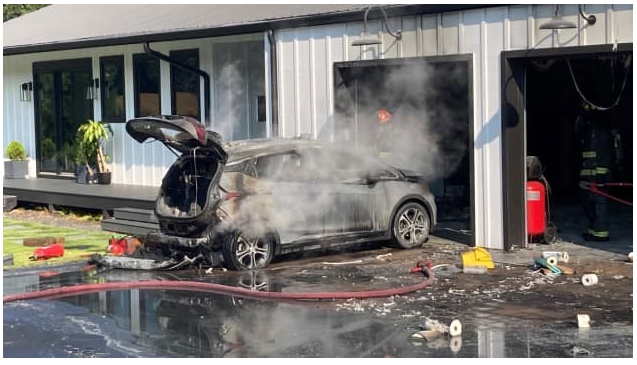Class Action: 2020-2022 Chevrolet Bolt Vehicles Equipped with Defective Battery, Prone to Catching Fire
by Erin Shaak
Kennedy v. General Motors Company
Filed: December 23, 2021 ◆§ 3:21-cv-09984
GM faces claims that the lithium-ion batteries used in the Chevrolet Bolt EV and Chevrolet Bolt EUV vehicles are defective and may spontaneously catch fire.
California
General Motors has been hit with yet another proposed class action that claims the lithium-ion batteries used in the Chevrolet Bolt EV and Chevrolet Bolt EUV vehicles are defective and may spontaneously catch fire.

The case centers on an August 2021 recall of certain model years of GM’s Chevy Bolt EV and EUV vehicles over concerns that the high-voltage batteries could ignite even when the electric cars are parked and unplugged. According to the 23-page case, although GM touted the safety of its Chevy Bolt vehicles in marketing and advertising, the cars “are neither safe nor functional for normal use.”
The case alleges that GM has so far “done nothing” to address the alleged defect in the Chevy Bolt batteries while drivers, on the other hand, have been exposed to a significant safety risk and forced to make “unforeseen accommodations” that prevent them from using their vehicles as expected.
“Simply put, Defendant is prioritizing profits over the health and safety of consumers,” the complaint reads.
While several similar lawsuits have sought to cover 2017 to 2019 model year Chevrolet Bolt vehicles, this case looks to cover the 2020 to 2022 Chevrolet Bolt EV and 2022 Chevrolet Bolt EUV.
The lawsuit explains that the Chevy Bolt vehicles are equipped with an Ultium lithium-ion battery and advertised with a mileage capacity of 259 miles on a full charge. Based on GM’s marketing and advertising representations of the Chevy Bolt, buyers and lessees reasonably expected to receive a functional and safe electric vehicle that could meet the advertised mileage capacity, the suit relays.
Contrary to GM’s representations, however, the defendant issued a recall notice in August 2021 that stated the lithium-ion batteries in the Chevy Bolt could spontaneously ignite when nearing a full charge, according to the complaint. GM warned in the notice that owners and lessees should not charge their vehicles more than 90 percent or allow the battery mileage to fall below 70 miles remaining, the case relays. Moreover, drivers were told not to park the vehicles indoors at night due to the risk of a fire.
A footnote in the complaint explains that when a Chevy Bolt driver complies with GM’s warning to not fully charge the battery, the car’s mileage capacity drops from 259 to 233.1 miles. If the driver also does not allow the vehicle’s remaining miles to fall below 70, the mileage capacity drops even further to 163.1, or only 62.97 percent of its advertised capacity, the lawsuit notes.
The plaintiff, who leased his Chevy Bolt only a month before GM issued the recall notice, says he has been forced to take unforeseen precautions in order to mitigate the risk of a fire, including by only charging his car in the morning and early afternoon and not overnight when it is most convenient for him; only parking the vehicle outdoors, at the end of his driveway and far away from other structures and cars; only using the car for short distances due to the battery’s limited charging capacity; having to use another vehicle for longer trips and accruing fuel expenses; and installing smoke alarms in his garage.
Per the case, GM has not informed drivers when the battery defect will be fixed and has left drivers with “significantly diminished use” of their vehicles.
The lawsuit looks to represent anyone who purchased a 2020, 2021 or 2022 model year Chevrolet Bolt EV or 2022 Chevrolet Bolt EUV in the U.S. for personal use and not for resale anytime during the past four years and until the class is certified.
Get class action lawsuit news sent to your inbox – sign up for ClassAction.org’s newsletter here.
Video Game Addiction Lawsuits
If your child suffers from video game addiction — including Fortnite addiction or Roblox addiction — you may be able to take legal action. Gamers 18 to 22 may also qualify.
Learn more:Video Game Addiction Lawsuit
Depo-Provera Lawsuits
Anyone who received Depo-Provera or Depo-Provera SubQ injections and has been diagnosed with meningioma, a type of brain tumor, may be able to take legal action.
Read more: Depo-Provera Lawsuit
How Do I Join a Class Action Lawsuit?
Did you know there's usually nothing you need to do to join, sign up for, or add your name to new class action lawsuits when they're initially filed?
Read more here: How Do I Join a Class Action Lawsuit?
Stay Current
Sign Up For
Our Newsletter
New cases and investigations, settlement deadlines, and news straight to your inbox.
Before commenting, please review our comment policy.